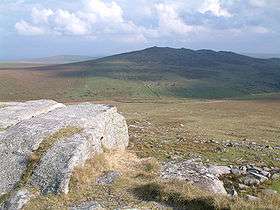Brown Willy effect

The Brown Willy effect is a meteorological phenomenon that sometimes occurs across the south-west peninsula of Britain. It leads to heavy showers developing over the high ground of Bodmin Moor in Cornwall, England, which then often travel a considerable distance downwind of their place of origin. It is named after the hill, Brown Willy, the highest point on the moor and in Cornwall as a whole. It is thought that the Boscastle flood of 2004 was caused by a particularly extreme example of the effect.[1]
Cause
Cornwall lies in the path of prevailing mild, moist westerly or south-westerly winds that blow in from the Atlantic Ocean. As these hit land, they are slowed by the effect of friction. Because Cornwall is a relatively narrow peninsula, winds near the south coast tend to be diverted to a more northerly direction, whilst winds near the north coast tend to be diverted southwards. This leads to a convergence zone near the central spine of the peninsula, leading to uplift and condensation of the moisture borne by them. The uplift is intensified by the altitude of the land on Bodmin Moor.
Furthermore, in the summer, the land heats more than the sea, which causes sea breezes to establish during the day, increasing convergence still further. Converging sea breeze fronts from the north and south coasts of Cornwall can lead to very rapid convection developing over the moor, which can result in very heavy showers or thunderstorms.
Once the showers have formed, they often travel in an easterly or north-easterly direction, driven by the prevailing wind. This can cause a thin line of showers to occur along the length of the south-west peninsula, all originating from the Brown Willy area. Places directly in the path of these showers can suffer a series of heavy downpours, whilst nearby locations remain dry. On March 27, 2006, a continuous line of showers stretched from Brown Willy to Burford, Oxfordshire — a distance of about 145 miles (232 km).[2]
References
- ↑ Miles, Paul (24 October 2009), "Bewitched - The Cornish coast in autumn charms Paul Miles", The Financial Times, p. 8, retrieved 2013-01-28 (subscription required)
- ↑ Plester, Jeremy (30 March 2006), "Fine line of showers makes 145-mile trip", The Times, p. 71, retrieved 2013-01-28 (subscription required)